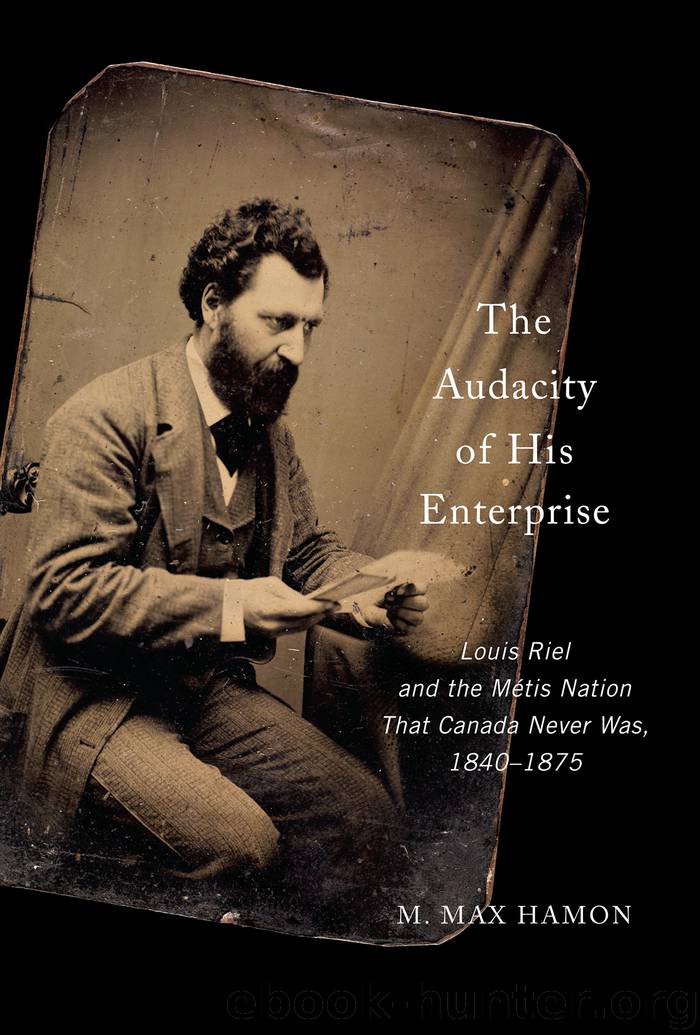The Audacity of His Enterprise by M. Max Hamon

Author:M. Max Hamon
Language: eng
Format: epub
Publisher: MQUP
Published: 2019-02-14T16:00:00+00:00
Riel knew well that Smith had been bribing others in order to break up the fragile political union.30 This had caused him considerable frustration; so by agreeing to spare Boulton’s life, he gained another ally. For Smith, Riel’s clemency was in fact necessary to excuse his support of Riel to an antagonistic Canadian audience. In his official report and in private letters, he explained that Riel’s change of heart regarding the execution of Boulton was a result of his own patient reasoning.
Riel’s position with regard to his Métis supporters was no easier. He faced increasing pressure from the Métis, who worried that, if mercy was shown too frequently, the “Canadas” would became bolder. The Métis guards at Fort Garry were unwilling to continue acting as virtuous guardians. The Canadas were growing more confident with each act of mercy, and were louder than ever in their abuse of the jail-keepers. One of them, Thomas Scott, was singled out for his efforts to insult and laugh at his captors.31 Riel pleaded with Thomas Scott to behave, but Scott replied stubbornly, “I am loyal and you are rebels.”32 He urged his fellows to escape and to fight. It didn’t help when Riel became ill, as a result of “brain-fever.”33 The Métis lost their patience when Scott attacked his guards and threatened Riel. They beat him violently.
The insolence and execution of Thomas Scott are perhaps the best-known incidents of the rebellion – the successful product of over a century of Canadian propaganda. The “mistake” of executing Thomas Scott has guided Canadian history for far too long. According to Stanley, “By one unfortunate error of judgment – this is what the execution of Scott amounted to – and by one unnecessary deed of bloodshed – for the Provisional Government was an accomplished fact – Louis Riel set his foot upon the path which led not to glory but to the gibbet.”34 Certainly, it allowed the English press to demonize Riel, and likely contributed to his own execution in 1885.35 To this day even, Riel’s decision to allow the killing continues to cause confusion and anxiety for a Canadian historical memory that is looking for “law and order.”36
Bumsted is much closer to the truth when he concludes that Scott may have been executed because he was a nobody, and therefore could be sacrificed. He was killed because he was a stranger with no kin ties. As we have seen community ties are essential for Métis governance and a lone, single male was a loose cannon.
Judging the past according to contemporary morals does not help us understand the event itself. Through infamy, important details and context are obscured. There are two points to make here: First, the outrage at Scott’s “murder” is informed by the false gaze of hindsight and the framework of justice that was later imposed by the settler state. If Riel had allowed Scott to live, the consequences could have been more dire in terms of ongoing public disorder. Second, he was not performing for the Canadian but for the Red River public.
Download
This site does not store any files on its server. We only index and link to content provided by other sites. Please contact the content providers to delete copyright contents if any and email us, we'll remove relevant links or contents immediately.
Becoming by Michelle Obama(10028)
Beartown by Fredrik Backman(5756)
The Last Black Unicorn by Tiffany Haddish(5638)
Man's Search for Meaning by Viktor Frankl(4607)
The Book of Joy by Dalai Lama(3986)
The Five People You Meet in Heaven by Mitch Albom(3569)
In a Sunburned Country by Bill Bryson(3543)
The Choice by Edith Eva Eger(3469)
Full Circle by Michael Palin(3450)
The Mamba Mentality by Kobe Bryant(3282)
The Social Psychology of Inequality by Unknown(3031)
Imagine Me by Tahereh Mafi(2962)
Book of Life by Deborah Harkness(2939)
The Checklist Manifesto by Atul Gawande(2855)
Less by Andrew Sean Greer(2696)
A Burst of Light by Audre Lorde(2608)
The Big Twitch by Sean Dooley(2437)
No Room for Small Dreams by Shimon Peres(2368)
Everest the Cruel Way by Joe Tasker(2342)
